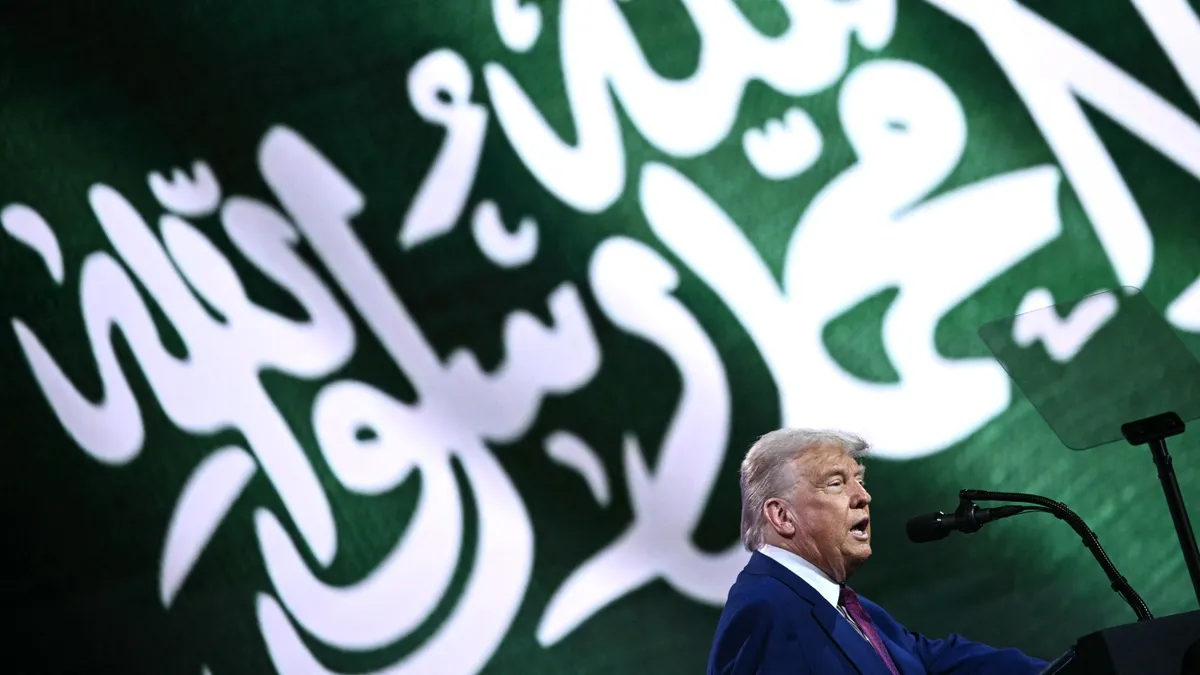
In a surprising announcement, President Trump declared on Tuesday that he would move to lift longstanding sanctions on Syria, which have been in effect since 1979. This decision marks a significant shift in U.S. foreign policy, particularly regarding Syrian President Ahmed al-Sharaa, whom the U.S. previously designated as the leader of a terrorist organization. During an investment conference in Riyadh, Saudi Arabia, Trump expressed optimism about the new government in Syria, hoping it would bring stability and peace to the war-torn nation.
Until recently, President al-Sharaa led Hayat Tahrir al-Sham, a group with ties to al-Qaeda that played a pivotal role in the overthrow of Bashar al-Assad's regime. Since being appointed head of a new interim government in January, al-Sharaa has focused on establishing international legitimacy. Trump's announcement coincided with his first major foreign policy address of his second term and comes as part of a broader diplomatic effort during his visit to Saudi Arabia.
Trump's visit to Saudi Arabia was not only a diplomatic mission but also a significant business undertaking. Accompanied by a delegation of top U.S. CEOs and Cabinet members, the trip underscored the business and security interests that bind the two nations. Saudi Arabia is evolving beyond its role as a key oil producer; it is now actively diversifying its economy and positioning itself as a global mediator. Crown Prince Mohammed bin Salman is spearheading this transformation, aiming to create millions of jobs for young Saudis while looking to the U.S. for security support.
During the visit, Trump praised the crown prince, calling him an "incredible man" and expressing his intent to fortify the bilateral relationship, which he claims is stronger than ever. This sentiment appears to contrast sharply with former President Joe Biden's approach, which included a notably awkward fist bump during a prior meeting. Trump's handshake with the crown prince symbolizes a renewed commitment to collaboration.
The trip was underscored by significant business deals that included commitments of at least $600 billion in investments from Saudi Arabia into the U.S. over four years. The White House detailed several major pledges, such as:
$142 billion in arms deals from over a dozen U.S. firms $80 billion in technology investments from companies like Google and Oracle $20 billion for AI data centers $14 billion for gas turbines from GE $4.8 billion in Boeing aircraft $2 billion for infrastructure services projectsDuring Biden's presidency, sales of precision-guided munitions to Saudi Arabia were halted due to concerns regarding the ongoing conflict in Yemen. However, with Trump back in office, there is a renewed opportunity for Saudi Arabia to upgrade its military capabilities.
Furthermore, discussions are ongoing regarding the establishment of a civilian nuclear program in Saudi Arabia utilizing U.S. technology. These talks are intricately linked to the kingdom's potential normalization of relations with Israel, which remains contingent upon the cessation of hostilities in Gaza and the initiation of a pathway toward Palestinian statehood.
Trump's ties to the Gulf extend beyond politics, with significant investments flowing into his business ventures. Recently, his son, Eric Trump, launched projects in collaboration with Saudi developers, including a luxury hotel and a golf course. Critics have raised concerns regarding the implications of these business dealings on Trump's presidency, particularly given his son-in-law, Jared Kushner, secured a substantial investment from the Saudi sovereign wealth fund.
Despite the focus on business, Trump's remarks also touched on pressing regional issues, including the ongoing conflict in Gaza. With reports indicating that nearly 53,000 individuals, including many children, have died due to Israeli attacks, Trump emphasized the need for a brighter future for the people of Gaza, contingent upon their leadership's choices. His administration's direct talks with Hamas have led to significant developments, including the release of an Israeli-American soldier.
Arab Gulf states are also looking to the U.S. for a measured approach in negotiations with Iran regarding its nuclear program. Trump expressed his desire to strike a deal that would curtail Iran's nuclear ambitions while warning of severe consequences should negotiations fail. "This is an offer that will not last forever," he stated, underscoring the urgency of the situation.
As the geopolitical landscape continues to evolve, Trump's diplomatic maneuvers in the Middle East reflect a complex interplay between business interests and international relations, with profound implications for the future.